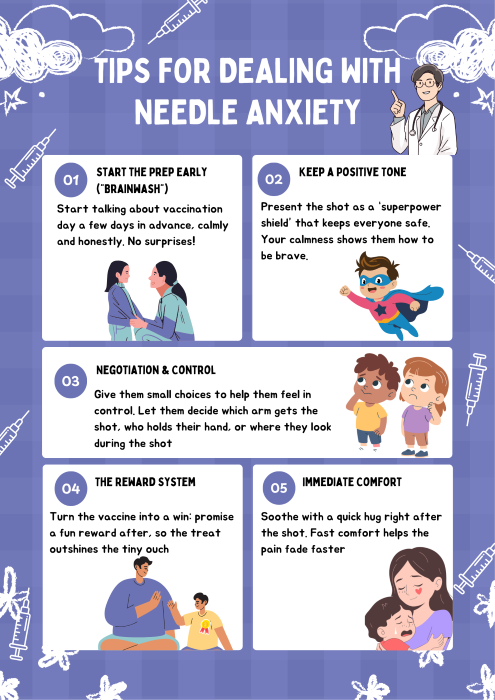
Dr Chew Bee Bee, a Consultant Paediatrician, Sunway Medical Centre, Velocity
As the year winds down and we look forward to long school holidays, festive gatherings, and precious family travel, our focus naturally shifts to making memories. Yet, in this busy period, one silent health threat often gets overlooked: Influenza (or more commonly known as the flu).
Influenza is a highly contagious, systemic illness that can lead to severe complications, unlike the common cold, which usually presents with milder symptoms and resolves in a few days. In Malaysia, where our tropical climate means the flu is a year-round threat, vigilance is essential.
To help parents better understand the threat of influenza and how to protect their families, we sat down with Dr Chew Bee Bee, a Consultant Paediatrician, Sunway Medical Centre, Velocity, who has seen firsthand how this virus impacts children and families.
Spotting the Red Flags: When is it More Than ‘Just a Cold’?
For parents, it can be tough to distinguish between a routine illness and something more serious. Dr Chew is quick to clarify that while the flu, COVID-19, and other viral infections share common symptoms like fever, influenza often announces itself with some distinct, alarming signs.
“The most common symptom for all viruses is fever, but influenza typically brings a very high fever, think 39∘°C to 40∘°C, that doesn’t respond well to common paracetamol,” – Dr Chew
Beyond the fever, Dr. Chew points to immediate ‘red flag’ visual cues she calls the ‘Influenza Look’:
- Extreme lethargy: The patient, often a child, appears profoundly sick, exhausted, and very tired.
- Bloodshot eyes: The whites of the eyes are red due to blood vessel congestion.
- Profuse Runny nose: It’s not just a trickle; it’s a substantial, ongoing flow.
More recently, Dr Chew also observed in her practice that influenza is causing more frequent vomiting and diarrhoea in patients, which naturally adds to the exhaustion and distress.
The Danger of Dismissing ‘Just the Flu’
Many parents may dismiss influenza as merely a severe cold. After all, young children often fall ill when they first start preschool. While it is easy for parents to want to manage every sniffle at home, influenza demands professional attention. Dr Chew stresses that the “just the flu” mentality is dangerous because of the high risk of complications, especially for high-risk groups.
So, when should you stop treating yourself at home and seek immediate medical help?
- Non-Negotiable Red Flag: Any fever over 39°C that is not responding well to medication. This level of fever raises concern for febrile seizures in children.
- Worsening General Condition: If your child is looking very sick, lethargic, and distressed, trust your instinct and seek help immediately. Unlike common fevers, influenza will not resolve quickly without specific antiviral treatment.
Fortunately, rapid testing (a simple swab) is available at most healthcare facilities to diagnose influenza quickly, and effective antiviral treatment exists.
Influenza poses the greatest risk to the very young (children below five years old), the elderly aged 65 and above, pregnant women, healthcare professionals, and those with underlying conditions such as chronic heart or lung disease, as their weaker immune systems make them more vulnerable to complications like pneumonia or respiratory failure. While healthy individuals usually recover, high-risk groups account for the majority of severe cases and influenza-related deaths worldwide. Children, meanwhile, often act as “super spreaders,” picking up the virus in schools or daycare and bringing it home to infect siblings, parents, and even grandparents.
“If you detect and treat it early, you stop the suffering quickly. Within three to five days, with proper treatment, the patient should recover quite fast.” – Dr Chew
The Climate Connection: Why We Need Year-Round Protection
In our tropical corner of the world, it’s not so predictable that flu cases mostly happen in winter like in Western countries; in Malaysia, flu cases happen all year round. Our constant warm weather means the virus circulates continuously.
However, Dr Chew notes that a surge in cases is often linked not only to the climate itself, but to human behaviour:
“We get more influenza cases during festive seasons and toward the end of December, followed by Chinese New Year, Raya and so on. This is because of all the close contact gatherings and international travel.”
Families travelling overseas, particularly to colder climates during their winter flu peaks, can easily catch the virus and bring it home, triggering a local spike of cases. This constant movement underscores the need for continuous protection, regardless of the month.
Your Simple Act of Family Love: The Annual Flu Shot
Annual influenza vaccination is the single most effective way to prevent infection. Once vaccinated, your body develops antibodies that protect against the most common circulating strains. But because the virus mutates frequently, the vaccine formulation is updated every year, making yearly shots essential. Given the year-round threat and the potential for severe complications, Dr Chew’s advice to parents is clear and simple: Vaccination is prevention, and prevention is better than a cure.
In her 15+ years of practice, Dr Chew has not seen serious adverse effects from the flu vaccine. The most common side effect is a mild fever post-injection, which usually resolves quickly. It is safe for young children and the older generation as well, and should be made an important annual activity for the whole family.
And here’s the good news: in Malaysia, the vaccine is widely available in private clinics and hospitals, and costs around RM60 – RM100 (depending on where you take it), a small investment for peace of mind.
Vaccination is prevention, and prevention is better than a cure.

Why Annual Vaccination is Crucial
-
Stay Ahead of the Flu: Update Your Shield Every Year
The flu virus is constantly evolving, so your protection should too. Usually, circulating strains tend to change every season, and vaccine manufacturers “update” the vaccine formula twice a year to match the latest strains. That’s why getting your flu shot annually is the best way to stay protected.
-
Creating a Family Cocoon
The vaccine triggers your body to build a defence (antibodies). When the whole family is vaccinated, from babies (6 months and up), the middle-aged, to the elderly and pregnant women, you create a “cocoon” of protection. This stops the virus from spreading to the most vulnerable members who can’t fight it off easily.
-
Proven Safe and Accessible
The flu vaccine has been well-studied and trusted for nearly 80 years, with a strong safety record. It remains widely accessible and generally affordable. In Dr Chew’s 15+ years of clinical experience, she has not encountered any serious adverse effects, reinforcing its reliability and safety.
“If you have the option to prevent your child from suffering from influenza, why not? It is the responsible act of a health guardian.”
This Children’s Day, as we celebrate the little ones who bring so much joy to our lives, let’s also commit to protecting their health. Because while festive gatherings and school holidays come and go, the gift of good health lasts far longer.
So before you pack your bags or welcome relatives home, take that simple but powerful step: book your whole family’s annual influenza vaccinations. It’s the best way to make sure your holidays are filled with laughter, not sick days.

____________________________________________________________________________

This article is an educational initiative by Sanofi.
#FluPreventionisAnActofLove #TakeFluCharge
















